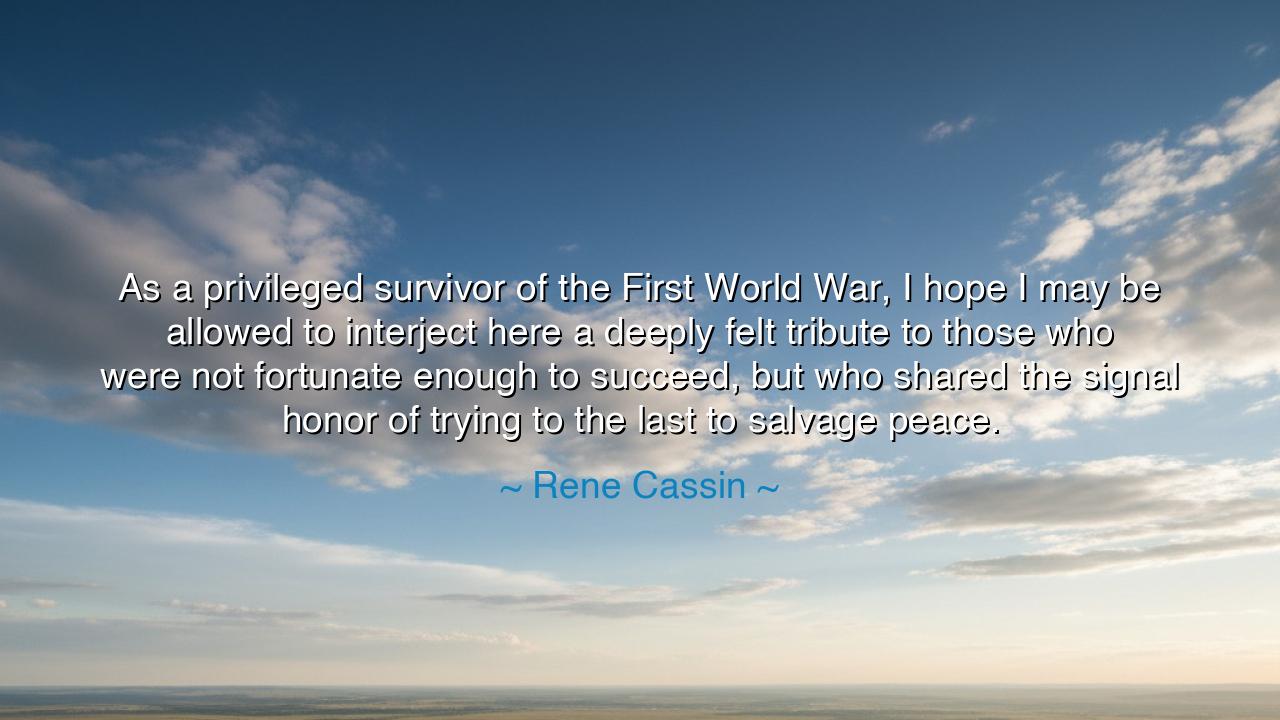
As a privileged survivor of the First World War, I hope I may be
As a privileged survivor of the First World War, I hope I may be allowed to interject here a deeply felt tribute to those who were not fortunate enough to succeed, but who shared the signal honor of trying to the last to salvage peace.






“As a privileged survivor of the First World War, I hope I may be allowed to interject here a deeply felt tribute to those who were not fortunate enough to succeed, but who shared the signal honor of trying to the last to salvage peace.” Thus spoke René Cassin, the French jurist, soldier, and philosopher of humanity, whose life became a bridge between the ruins of war and the dawn of human rights. In these words—humble, sorrowful, and luminous—Cassin gives voice to the eternal gratitude of the living toward the dead, and to the sacred duty of memory. He speaks not as a victor, but as one who carries the burden of survival, and with it, the obligation to honor those who perished in the pursuit of peace.
The origin of this quote lies in Cassin’s deep experience of war and loss. He fought in the trenches of the First World War, where the earth itself seemed to bleed, and men were reduced to shadows beneath clouds of poison and fire. Wounded in body, but more deeply in spirit, he emerged from that inferno changed—convinced that no victory could justify such suffering. When he calls himself a “privileged survivor,” it is not with pride but with reverence. He speaks for the countless who did not return, for those whose courage and sacrifice became the soil from which a new vision of humanity would grow. His tribute is not only to soldiers, but to all who, in a time of madness, held fast to honor, hope, and the ideal of peace.
Cassin’s words echo with the nobility of ancient heroes, yet they are tempered by the sorrow of modern tragedy. Like Hector of Troy, who fought not for conquest but for the defense of his people, the men Cassin honors were warriors of duty, not of glory. They “tried to the last to salvage peace,” knowing that their efforts might fail, but believing that to stop striving for peace would be the ultimate defeat. In their endurance, Cassin sees the highest form of courage—not the will to destroy, but the will to preserve; not the hunger for victory, but the refusal to surrender one’s humanity amid chaos. This is the signal honor he speaks of: the moral greatness of those who, even in dying, affirmed the sanctity of life.
After the war, Cassin devoted himself to ensuring that the sacrifice of millions would not be in vain. He became one of the principal architects of the Universal Declaration of Human Rights—a document born of the same faith he extols in his quote. Having witnessed the worst that man could inflict upon man, he sought to enshrine the best that mankind could aspire to. The peace he speaks of is not mere silence after battle, but the peace of justice, dignity, and respect for the human spirit. When he pays tribute to those who fell, he honors them not with monuments of stone, but with principles that guard the living—the right to freedom, to safety, to compassion. In his vision, every act of mercy, every defense of truth, becomes a continuation of the work they began.
Yet, there is also sorrow in his tone—a quiet awareness that peace, though pursued with all the courage of men, remains fragile. Cassin had lived long enough to see the promise of peace betrayed by the fires of the Second World War. He had seen nations rise again in hatred, and the dreams of the fallen trampled once more beneath ambition. And yet, he did not despair. His words are both elegy and exhortation: a reminder that the responsibility of the survivor is to persist, to carry forward the vision that the dead could not complete. For to forget them is to let them die a second time, and to abandon their dream is to repeat their tragedy.
The meaning of Cassin’s reflection transcends its time. Every generation has its own battle between the forces of war and the guardians of peace. His words remind us that peace is not a gift, but a discipline—a sacred labor sustained by courage, patience, and remembrance. Those who strive for peace are often mocked, dismissed as naïve, or crushed by the violence of the world. Yet Cassin insists that theirs is the greater honor. It is easy to fight; it is far harder to reconcile. It is simple to destroy; it is divine to rebuild. The men who fell, he tells us, did not fail because they could not win—they succeeded because they did not stop believing in what was worth saving.
So, my friends, let us take from René Cassin’s words a lesson as old as civilization itself: that the truest victory is not conquest, but compassion. Honor the fallen not only with remembrance, but with action—by striving, in your own life, to “salvage peace” in every small and noble way. Speak kindly where others condemn, build bridges where others burn, and seek understanding where others sow discord. For peace, like life, survives only through those who choose to protect it.
And when your time comes to look back upon your own journey, may you be counted among those whom Cassin praised—the ones who, even in the face of despair, “tried to the last” to uphold the dignity of humanity. For theirs is the only honor that endures: the honor of those who kept the flame of hope alive in a world that had forgotten the light.






AAdministratorAdministrator
Welcome, honored guests. Please leave a comment, we will respond soon